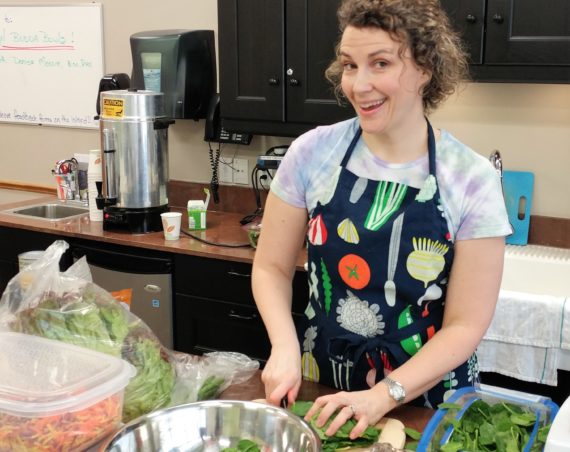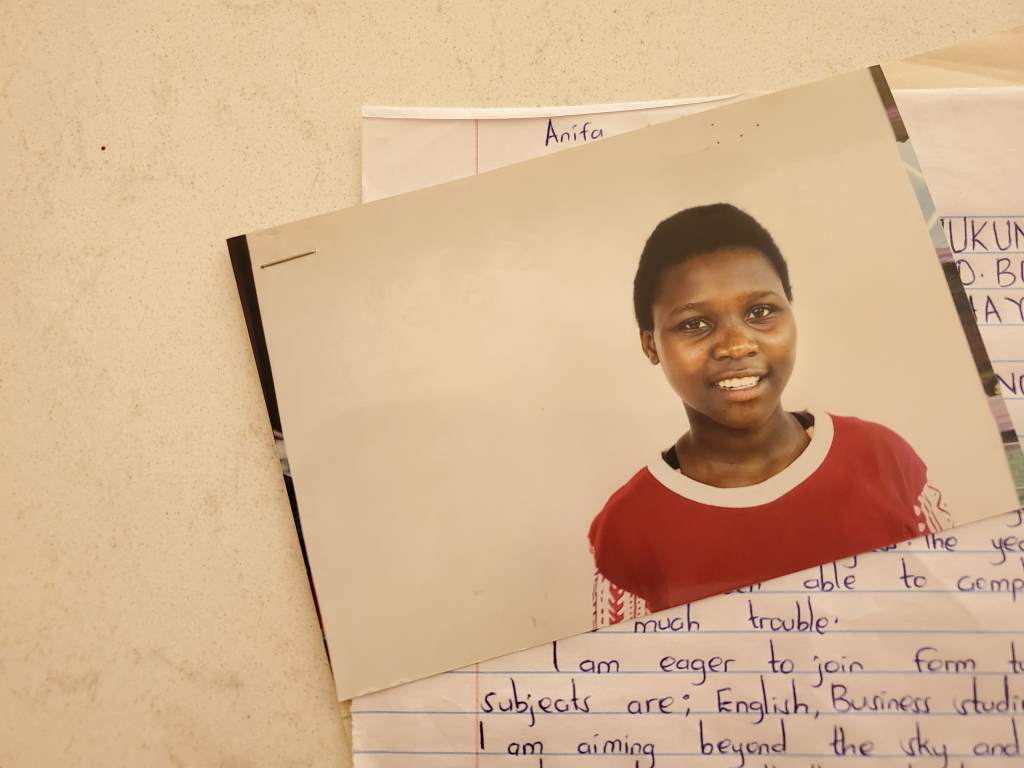Kristi Soomer is an entrepreneur, ethical-fashion advocate, minimalist and surfer with a serious case of wanderlust. While traveling 100,000+ miles a year, she became frustrated with the lack of stylish travel clothing and founded her own travel fashion line, Encircled. A self-taught designer, Kristi takes traditional silhouettes and infuses style with function to help women do more with less.
We chatted with Kristi about the problems with “fast fashion”, how to choose eco-friendly fabrics, and why she decided to create her clothes in Canada and not abroad.
WEHL: Tell us a little about yourself and why you became interested in wellness.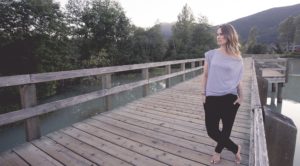
KS: I’m a former management consultant, turned eco-fashion entrepreneur. I grew up in Toronto, and have a business undergrad degree from Western University and an MBA from Queen’s. I’m definitely an unlikely fashion designer – I have zero formal training.
I am passionate about traveling, the environment, and healthy living.
Health and wellness has always been a part of my life. I grew up playing competitive sports (Ice hockey, tennis, soccer, golf, volleyball), so nutrition and fitness were always front and center. My mom was also very interested in natural medicine growing up, so by osmosis I learned a lot about vitamins, herbs and natural treatments. I’ve been engaged with naturopathic medicine since I was in high school and have seen the positive effects.
WEHL: What’s your philosophy on wellness?
KS: Moderation.
Because of my earlier life as an athlete, I’d always viewed wellness in the extreme sense. This continued into my post-sports life in my 20s and I’d workout 6-7 times a week and avoid any carbs. Now, I view things differently.
A “workout” for me could now be an hour-long HIIT session at Barry’s Bootcamp, or it could be a 5k walk with my dog. Eating healthy is key for me, but I try not to be too hard on myself if I fall off the wagon. At the end of the day, I’m trying to always be better than the day before, and not trying to be perfect.
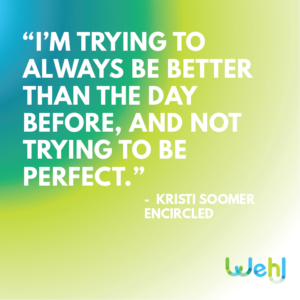
WEHL: What is Encircled and why did you decide to start your company?
KS: Encircled is a women’s fashion brand that is on a mission to help bring sustainability and humanity back into fashion. We make versatile womenswear from sustainable fabrics in Toronto, Canada, and design with the idea of helping women do more with less in their wardrobes. We sell direct to consumers through our website, allowing us to offer sustainable clothing at an accessible price point.
I decided to start Encircled after being frustrated with a lack of versatile clothing for travel, that was also stylish. I was working as a management consultant, and literally living out of a carry-on. I had come up with a product idea after my suitcase broke while packing for a yoga retreat – the Chrysalis Cardi – and decided to see it through. The idea of the design was that you got 8 pieces in 1. I continued to run Encircled while I was working, part-time on the evenings and weekends for almost 2.5 years, until I finally quit my job.
I don’t know if I ever envisioned Encircled where it is today – it just kind of evolved that way as the demand and interest in our brand grew.
WEHL: What are the social and environmental problems with “fast fashion”?
KS: The fast fashion model has severe negative impacts on the planet and humanity.
One of the primary issues with fast fashion is the concept in itself. Fast fashion is designed for speed – the idea is to release more frequent collections of clothing, and do so quickly and at a low cost. Previous to fast fashion, there were only 4-5 seasons per year. Now, fast fashion retailers are releasing collections sometimes as frequently as weekly.
Firstly, this is a lot of clothing in general. The volume of this clothing being made cannot even be worn. The clothing is often trendy, and poorly made, and ends up in a donation bin or garbage by end of season, adding pollution to our landfills.
Second, fast fashion is cheap. To make a garment at a low cost, you can’t spend a lot on labour or construction costs. That means, someone is likely being exploited in the supply chain, and possibly this garment isn’t as well-made. Human exploitation and sweatshop labour are very prevalent in the fashion industry and are what allow a retailer to charge $10 for a t-shirt.
Third, fast fashion uses inferior materials. Many of which are designed to degrade or fall apart, and ultimately sit in our landfills for decades. Until lately, most fast fashion is synthetics or traditional cotton. Both of which are rife with chemicals and leave a trail of environmental destruction in their creation.
WEHL: What material is your clothing made out of and why did you choose it?
KS: We primarily use a fabric called Lenzing™ Modal. Modal is considered a semi-synthetic fabric because it’s naturally derived from beech tree pulp but requires processing to become a fiber. Modal uses less energy to produce, and yields much more fiber per kg of Modal than Cotton. It also uses 10-20x less water to produce than cotton and 95% of the processing materials are recovered. As it’s semi-synthetic, and will return to the earth in our lifetime, but it’s also not as ‘natural’ as cotton. (Source)
We love Modal because it’s soft, drapey and flattering. It also has good durability, and is relatively wrinkle-resistant naturally, making it the perfect travel fabric. It just feels good against your skin. Many of our customers rave about how lovely it is!
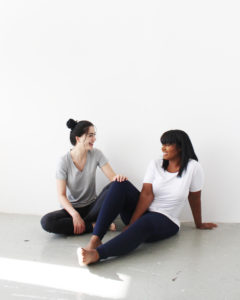
We also use some Rayon from Bamboo in our collection, MicroModal, Tencel and Merino Wool.
WEHL: What are some of the most eco-friendly fabrics?
KS: This is such a good question that requires a bit of an explanation. When I first started in this industry, I assumed fabrics were either good or bad. Turns out, this is a very grey subject area.
The most eco-friendly fabrics are those that are efficient to create, have environmentally friendly processes in which minimal chemicals are used, and are made from raw materials that are renewable, and sustainable.
The assumption amongst many consumers is that cotton is a great fabric as it’s natural and from the earth. However, while it is a natural fiber, it also is extremely water consumptive – as an example, it takes about 2,500 liters of freshwater to make just one t-shirt (Source).
To me, it’s important to find fabrics that balance off eco-friendliness, with longevity, and wearability. No one wants to wear pants that are scratchy and uncomfortable, just because they’re eco-friendly. You need to design and use fabrics that suit a consumer’s lifestyle, and bring value beyond the sustainability.
WEHL: Are there certain chemicals that we should stay away from that are commonly found in “typical” clothing?
KS: Yes, there are many chemicals that you should try to avoid in clothing.
Traditional Cotton is one of the most pesticide-laden crops in agriculture. While some of these pesticides end up washing into groundwater during production, many of them remain in the fabric, and ultimately against your skin and into our water system on washing.
Another common chemical that is widely banned, but found regularly still in overseas fabrics is Azo. Azo-dyes are known for their steadfastness but a proportion of them have been found to be carcinogenic (Source).
Lastly, something else that consumers don’t realize is that “wrinkle-free” dress shirts and pants are often treated with formaldehyde, which can be toxic in high levels.
This is a great resource for understanding chemicals that may be in your clothing.
All of the fabrics we use at Encircled are certified STANDARD 100 by OEKO-TEX® which ensures they are free of harmful chemicals. This is important to protect the safety of our consumers, and provides peace of mind for us.
WEHL: Do you have any tips that you can give us to build a sustainable wardrobe?
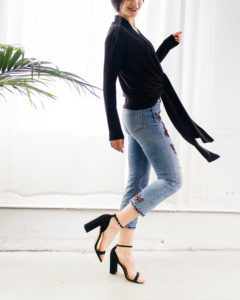
KS: Start where you are today. Nothing is less sustainable than donating or throwing out your whole wardrobe to start from scratch.
Take an inventory of what you have already, consider your lifestyle and start being more mindful about your clothing purchases going forward.
WEHL: What should we be looking for when we purchase ethical clothing?
KS: The first thing I do when I shop for clothing is feeling the fabric. The next, read the labels. I want to see where the clothing is made, and what it’s made from. Doing research on fabric options can help put you on a path to a more sustainable wardrobe. Lastly, don’t be afraid to reach out to the brands before you buy and get information on how their clothing are made and where. Just because someone states their clothing is “ethical” doesn’t mean it is. Do your own research and become a more informed consumer.
WEHL: We noticed that you take a lot of inspiration from traveling; how has Encircled benefited from this?
KS: Traveling the world has given me a new perspective not only on the environment but humanity. It’s also made me a savvy packer, and a devout carry-on only traveler. As such, I always think versatility first when brainstorming ideas, and use that lens to challenge any ideas that we have. I want to make sure we’re making clothing that has a clear purpose and adds value to our customers’ closets.
Also, being a frequent traveler afforded me a lot of opportunities for free photoshoots in amazing places like Bali, Whistler and Portugal!
WEHL: Why did you want to make your clothing in Canada instead of internationally?
KS: I read about the human rights and environmental atrocities of overseas production. I also saw an industry in Canada, that was once a huge employer, and was now in shambles. There’s something very interesting about helping to revive an industry, and rebuilding something from the ground up. You feel like you’re truly part of a movement!
Making our clothing in Canada also allows us to have a close relationship with our makers – face to face. We’re not just visiting a factory twice a year, we’re there every single week. From a supply chain perspective, it allows us to pivot quickly, keep a close eye on quality and turn our product faster than our competition. Ethically, we know that workers are treated well in Canada as they’re protected by extensive labour legislation, and the environment is respected during production.
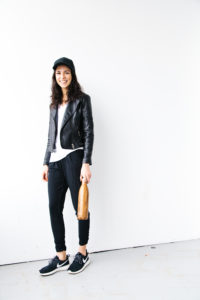
WEHL: You are a certified B Corporation; what inspired you to get this certification?
KS: We decided to pursue the B corporation certification because of what I talked about earlier – that anyone can SAY they’re ethical, but to prove that is much more difficult. The certification is a third party audit of our processes, financials and capabilities – for us, it was a great exercise in identifying areas where we could be even better, and for consumers, it gives them the confidence of knowing that our commitment to use business as a force for good is embedded into our corporation.
WEHL: Do you have any advice for an entrepreneur who’s interested in building a socially and environmentally conscious business?
KS: Start with the customer in mind. Ultimately, you need to create a product/service that customers want. Whether it’s sustainable or not, otherwise you won’t be able to get any traction.
Price your product or service with enough margin to support your business’s growth and principles. Being a sustainable brand has a huge on-cost. You’re competing with fast fashion retailers who have 80% margins at a $10 price point. You need to be smart about every dollar you spend from how much you produce to how you retail your clothing.
Try to look at your business holistically and how you can integrate sustainability beyond just the materials you use. We try to take a full view of our process from how we ship a package to how we power our studio, to the paper we print on.
Go for it. The world needs more people who are passionate about making the world a better place and using business as a way to do so.
Connect with Kristi and Encircled:
- Web: www.encircled.ca
- Email: [email protected]
We invite you to join our all-in-one healthy lifestyle app at Wehl.com!


